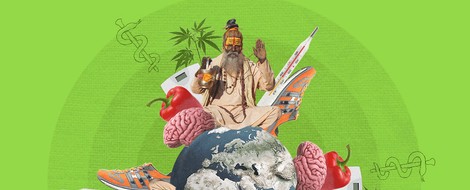Your podcast discovery platform
Curious minds select the most fascinating podcasts from around the world. Discover hand-piqd audio recommendations on your favorite topics.

piqer for: Global finds Health and Sanity Doing Good
Bangalore-based Rashmi Vasudeva's journalism has appeared in many Indian and international publications over the past decade. A features writer with over nine years of experience heading a health and fitness supplement in a mainstream Indian newspaper, her niche areas include health, wellness, fitness, food, nutrition and Indian classical Arts.
Her articles have appeared in various publications including Mint-Wall Street Journal, The Hindu, Deccan Herald (mainstream South Indian newspaper), Smart Life (Health magazine from the Malayala Manorama Group of publications), YourStory (India's media technology platform for entrepreneurs), Avantika (a noir arts and theatre magazine), ZDF (a German public broadcasting company) and others.
In 2006, she was awarded the British Print-Chevening scholarship to pursue a short-term course in new-age journalism at the University of Westminster, U.K. With a double Masters in Globalisation and Media Studies from Aarhus Universitet (Denmark), University of Amsterdam and Swansea University in Wales, U.K., she has also dabbled in academics, travel writing and socio-cultural studies. Mother to a frisky toddler, she hums 'wheels on the bus' while working and keeps a beady eye on the aforementioned toddler's antics.
Taking The Devil Away: A Tale Of Reinterpreting Schizophrenia
As part of an issue that explores aspects of the ‘self’ comes this poignant and wrenching story of a father grappling with his son’s schizophrenia.
The story begins with the father discovering that his son's ‘odd’ behaviour was not, as he thought, the sign of an eccentric genius, but instead it was his neural networks ‘misfiring’. The father imagines a future for his beloved child—a time ahead of homelessness, joblessness and increased likelihood of addiction, not to mention the many stigmatic associations with the dreaded disease, schizophrenia.
For 15 years, the father and son tried every treatment. And then the story takes an unusual turn—and this is the tale of this ‘crazy’ turn.
The article argues rather effectively about how cultures and communities are the key to dealing with schizophrenia. However counterintuitive it may seem, some researchers agree schizophrenics can be more reconciled with their conflicting selves in collectivist and interdependent communities (like in developing countries) rather than in developed countries that are more individualistic and autonomous.
But of course, it is good to remember here that this equation can be complicated by other cultural factors such as isolation of the mentally ill, stigma and lack of medication.
This is not to say Frank Russell, the protagonist of this story, was cured by his interaction with a healer from Burkina Faso in West Africa. (I will not spoil the pleasure of reading through his illuminating journey.) But he was certainly able to reduce his medication and lose weight; he is, as his father observes, more courteous, alert and engaged. His bad days are fewer and farther between and most importantly, Frank no longer views himself as a crazy person. In his mind, he is a painter, a student, a poet and a welder. Not a madman.
Evidently, there is a lesson in here somewhere.
